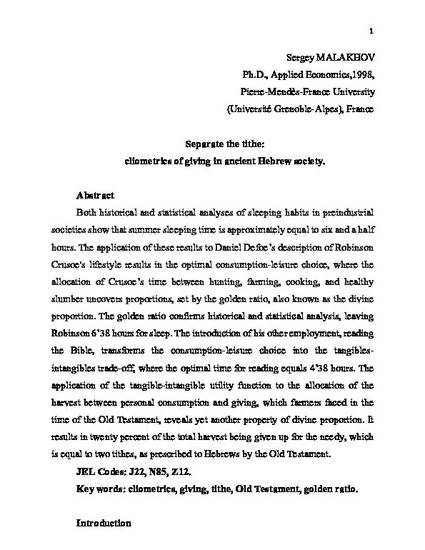
Unpublished Paper
Separate the tithe: cliometrics of giving in ancient Hebrew society.
Economics
(2022)
Abstract
Both historical and statistical analyses of sleeping habits in preindustrial societies show that summer sleeping time is approximately equal to six and a half hours. The application of these results to Daniel Defoe’s description of Robinson Crusoe's lifestyle results in the optimal consumption-leisure choice, where the allocation of Crusoe’s time between hunting, farming, cooking, and healthy slumber uncovers proportions, set by the golden ratio, also known as the divine proportion. The golden ratio confirms historical and statistical analysis, leaving Robinson 6’38 hours for sleep. The introduction of his other employment, reading the Bible, transforms the consumption-leisure choice into the tangibles-intangibles trade-off, where the optimal time for reading equals 4’38 hours. The application of the tangible-intangible utility function to the allocation of the harvest between personal consumption and giving, which farmers faced in the time of the Old Testament, reveals yet another property of divine proportion. It results in twenty percent of the total harvest being given up for the needy, which is equal to two tithes, as prescribed to Hebrews by the Old Testament.
Keywords
- cliometrics giving tithe golden ratio
Disciplines
Publication Date
Winter December 10, 2022
Citation Information
Sergey V. Malakhov. "Separate the tithe: cliometrics of giving in ancient Hebrew society." Economics (2022) Available at: http://works.bepress.com/sergey_malakhov/37/
